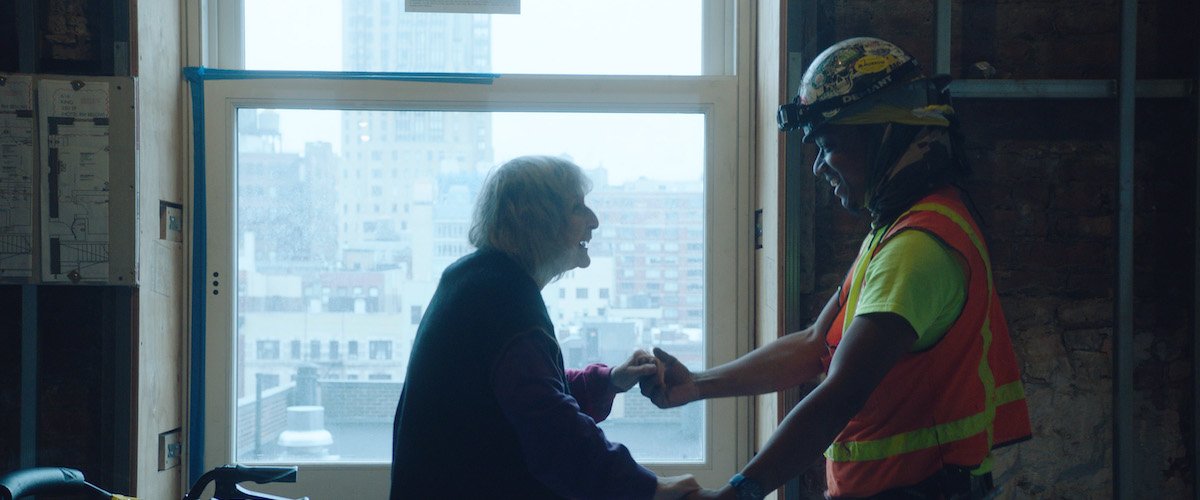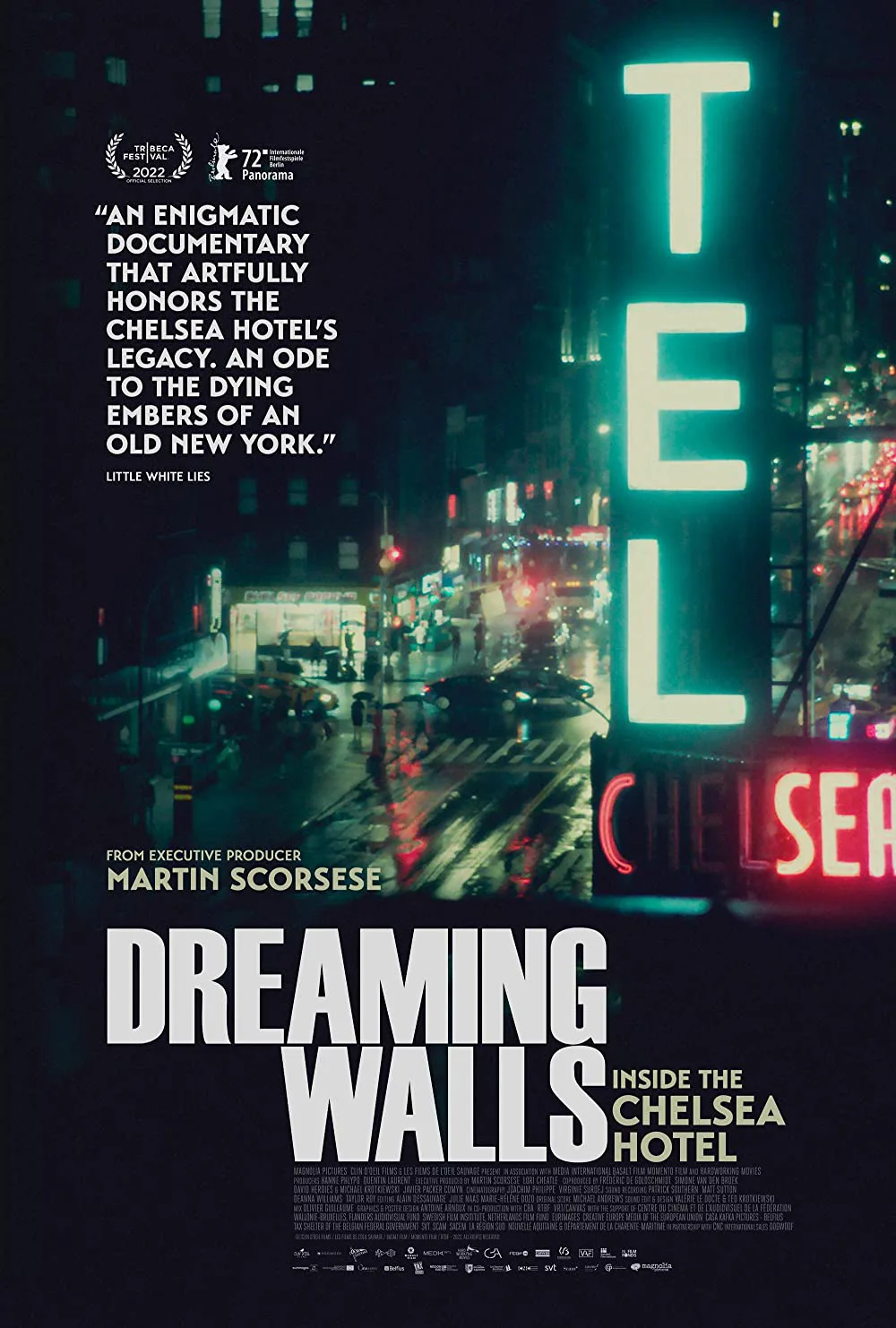Built between 1883 and 1885, the Hotel Chelsea is perhaps one of the most famous—and infamous—buildings in New York City. Writers like Arthur C. Clarke and Allen Ginsberg wrote seminal works there. It was home to many musicians, filmmakers, and artists like Bob Dylan, Stanley Kubrick, Willem de Kooning, and Jane Fonda. It’s where Nancy Spungen, girlfriend of Sid Vicious, was found stabbed to death, and where Dylan Thomas spent his final days. A NYC landmark since 1966, the hotel no longer accepts long term residents and after a decades-long renovation, it has reopened as the city’s latest boutique destination.
Amélie van Elmbt & Maya Duverdier’s lyrical documentary “Dreaming Walls: Inside the Chelsea Hotel” is an elegy for the hotel’s past and a final look at the last of the residents who still reside within its walls. If only it weren’t as beguiled by the ghosts, past and present, that still haunt the hotel itself.
Part a reverential history of the hotel, part a look at the complex situation for the remaining residents within the hotel during the drawn out renovation process, van Elmbt and Duverdier’s film is noticeably in love with the mythology and living history of the place. Beautifully photographed by cinematographers Joachim Philippe and Virginie Surdej, the way the film stalks the hallways, lingering on the cracks and other imperfections that will soon be smoothed away, is reminiscent of Chantal Akerman’s 1973 documentary “Hotel Monterey.” There is a certain undeniable beauty in this decay, an aesthetic made to be captured on film. But the reality of living within this decay is always just out of frame.
There is a clear bias here towards the past bohemia the hotel represents. And there is a much greater focus on the myth that will be demolished by renovation, without much of an exploration into the reality of the squalor residents were living in. The residents who have resisted the renovations are framed with wonder and awe, while those who have agreed to settlements are painted in a much more negative light. The film is dedicated to “all those who once stayed at the Chelsea … and to their dreams,” which is fitting because the filmmakers are more invested in the mythic qualities of its past than in interrogating the reality of gentrification. The same goes for the implications of what it means for the city, that a historic monument of such prominence as the Hotel Chelsea has been turned into yet another boutique hotel.
In the foreword to the book Hotel Chelsea: Living in the Last Bohemian Haven by Colin Miller and Ray Mock, former child residents and sisters Gaby Hoffmann and Alex Auder have a clear-eyed conversation of growing up in the hotel in all its majesty and its squalor. They reminisce about how their mother took refuge in the hotel because former manager Stanley Bard didn’t ask for a deposit or make them sign a lease. They also discuss the irony of rich people who moved into the hotel in the 2000s choosing to live the “bohemian” lifestyle they were forced to live by circumstance, in turn helping the owners slowly price out longtime residents. Within the history of the Chelsea is a larger story to be told about both the gentrification of the building and of the art world.
The one interview in “Dreaming Walls” that manages to successfully straddle the line between overwhelming nostalgia and the cost of gentrification comes from multimedia artist Steve Willis. What starts out as the story of how Willis snagged a residency in one of the rooms once occupied by Janis Joplin (after he produced a Mariah Carey music video in the hotel), ends with a tour of what he gave up in his settlement to remain a resident. Now living in a cramped studio, Willis lost a hallway, kitchen, and bathroom. Touring the section in the midst of renovation Willis shows the filmmakers a wall he painted blue and the toothbrush holder that once held Joplin’s toothbrush, all set to be demolished. While the hotel itself will be marked using its past residents to lure people to spend $300 a night, these small details of its rich past are apparently not worth preserving.
It’s in exploring the iconography of the hotel that the documentary shines the brightest. Van Elmbt and Duverdier are clearly well-versed in the works that were created on the grounds, or by former residents, and do their best to imbue their film with the same timeless cool that pulses through them. Excerpts from journal entries, novels, and other texts are read throughout the documentary. Imagery from films like Ronald Nameth’s “Andy Warhol’s Exploding Plastic Inevitable” (which, ironically, was actually filmed during a week of performances in Chicago) and footage of celebrity tenants like Patti Smith are projected on the hotel’s decrepit walls, which is both an homage to filmmaker and Warhol collaborator Jonas Mekas, who pioneered projecting film on walls during live performances, and a metaphor for the history that will forever permeate throughout the hotel. The collage effect is haunting and gorgeous, although it speaks more to the lasting power of the original art than it does their implementation here.
If the goal of “Dreaming Walls” is to create one last kaleidoscopic portrait within the Chelsea before all of its soul and history is renovated away, packaged and sold as a destination for the bourgeoisie, van Elmbt and Duverdier manage to do just that, despite their film leaning more towards imitation than the truly innovative work they so revere. While it doesn’t quite rise to the artistic heights it aims for, “Dreaming Walls” will satisfy viewers who want to linger a little longer in the storied halls of the Hotel Chelsea.
Now playing in theaters.




















